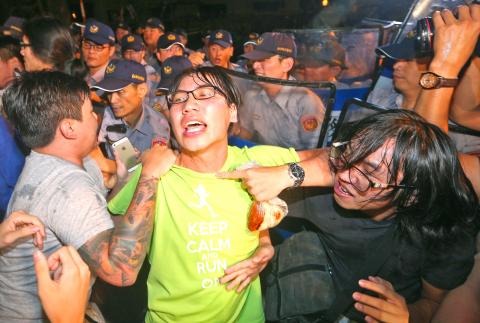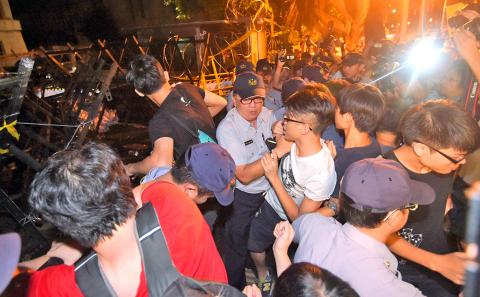High-school student protesters and civic groups yesterday rallied outside the Ministry of Education building in Taipei, demanding the release of students arrested in the early hours of the morning after breaking into the complex.
“We demand that our comrades be immediately released and not be subjected to violent judicial hunting,” Taoyuan High School Alliance spokesperson Liao Hao-hsiang (廖浩翔) said.
“If the ministry does not give us a reasonable and positive response today, we will continue our protest, refusing to bend in spite of last night’s [Friday morning’s] violent expulsion,” he said.

Photo: CNA
He repeated demands that proposed adjustments to high-school curriculum guidelines be removed and that new regulations covering adjustments be introduced to prevent a repetition of the controversy.
The curriculum guidelines have sparked protests over what critics call a “China-centric” focus and an opaque “black box” approval process.
Hsinchu and Miaoli Anti-Curriculum Guidelines Working Group convener Mu Yu-feng (慕宇峰) said the ministry’s stance had “compelled” students to take more extreme measures.

Photo: Wang Min-wei, Taipei Times
“We have already tried numerous peaceful protests and the government has lost a lawsuit, but it has remained totally unmoved,” Mu said.
The ministry is appealing a ruling by the Taipei High Administrative Court ordering it to release a complete list of the curriculum review committee members, along with meeting minutes and voting results.
Northern Taiwan Anti-Curriculum Changes Alliance spokesperson Wang Pin-chen (王品蓁) said the ministry had refused to allow public meetings between activists and Minister of Education Wu Se-hwa (吳思華) or his deputies.
“On this matter, we have been like a mute person eating canker root — there is no choice but to suffer in silence,” Wang said.
At a forum on Thursday night, K-12 Education Administration Director Wu Ching-shan (吳清山) did not take the students seriously, instead repeating ministry talking points like a “skipping needle,” she said.
She said students decided at an impromptu meeting to break into the ministry compound after they stormed out of the forum, denying that there was any involvement by external political forces.
More than 20 students scaled barricades late on Thursday night, forcing open two side doors and locking themselves in the minister’s second-floor office.
Other than a side door found off its hinges, it was unclear whether there had been any damage, with students claiming that they had not damaged anything in the offices.
While the ministry said in a press release that students had damaged a reception desk and broken down the minister’s office door, officials blocked reporters from accessing the ministry’s second floor yesterday morning, claiming that damage to the site had already been restored to allow the ministry to conduct normal operations.
A video recorded by a student and posted online showed an impromptu barricade of chairs and potted plants against an office door, but there were no visible signs of damage.
Before the person behind the camera was subdued, police were shown dragging protesters across the office floor, with a line of others yelling slogans as they sat at the back of the room.
The ministry said 33 people had been arrested: 24 students, three reporters and six non-student protesters.
Eleven minors were among those arrested, it said.
Following news of the students’ arrests, more than 100 people gathered outside the ministry complex early yesterday morning to demand their release. They were later dispersed by police.
Wang said that all but one of the students were handcuffed and refused access to their mobile phones, making it impossible for their parents to contact them.
Taiwan Association for Human Rights legal specialist Hsu Jen-shuo (許仁碩) said the handcuffing of students was “disproportionate” and a breach of the Police Power Exercise Act (警察職權行使法), which allows handcuffing only if someone attempts to escape or resists arrest.
Because the students were only sitting in protest before they were arrested, the police had no right to handcuff them and indirectly deprive them of their ability to contact a lawyer or their parents, Hsu said.

SECURITY: As China is ‘reshaping’ Hong Kong’s population, Taiwan must raise the eligibility threshold for applications from Hong Kongers, Chiu Chui-cheng said When Hong Kong and Macau citizens apply for residency in Taiwan, it would be under a new category that includes a “national security observation period,” Mainland Affairs Council (MAC) Minister Chiu Chui-cheng (邱垂正) said yesterday. President William Lai (賴清德) on March 13 announced 17 strategies to counter China’s aggression toward Taiwan, including incorporating national security considerations into the review process for residency applications from Hong Kong and Macau citizens. The situation in Hong Kong is constantly changing, Chiu said to media yesterday on the sidelines of the Taipei Technology Run hosted by the Taipei Neihu Technology Park Development Association. With

CARROT AND STICK: While unrelenting in its military threats, China attracted nearly 40,000 Taiwanese to over 400 business events last year Nearly 40,000 Taiwanese last year joined industry events in China, such as conferences and trade fairs, supported by the Chinese government, a study showed yesterday, as Beijing ramps up a charm offensive toward Taipei alongside military pressure. China has long taken a carrot-and-stick approach to Taiwan, threatening it with the prospect of military action while reaching out to those it believes are amenable to Beijing’s point of view. Taiwanese security officials are wary of what they see as Beijing’s influence campaigns to sway public opinion after Taipei and Beijing gradually resumed travel links halted by the COVID-19 pandemic, but the scale of

A US Marine Corps regiment equipped with Naval Strike Missiles (NSM) is set to participate in the upcoming Balikatan 25 exercise in the Luzon Strait, marking the system’s first-ever deployment in the Philippines. US and Philippine officials have separately confirmed that the Navy Marine Expeditionary Ship Interdiction System (NMESIS) — the mobile launch platform for the Naval Strike Missile — would take part in the joint exercise. The missiles are being deployed to “a strategic first island chain chokepoint” in the waters between Taiwan proper and the Philippines, US-based Naval News reported. “The Luzon Strait and Bashi Channel represent a critical access

Pope Francis is be laid to rest on Saturday after lying in state for three days in St Peter’s Basilica, where the faithful are expected to flock to pay their respects to history’s first Latin American pontiff. The cardinals met yesterday in the Vatican’s synod hall to chart the next steps before a conclave begins to choose Francis’ successor, as condolences poured in from around the world. According to current norms, the conclave must begin between May 5 and 10. The cardinals set the funeral for Saturday at 10am in St Peter’s Square, to be celebrated by the dean of the College